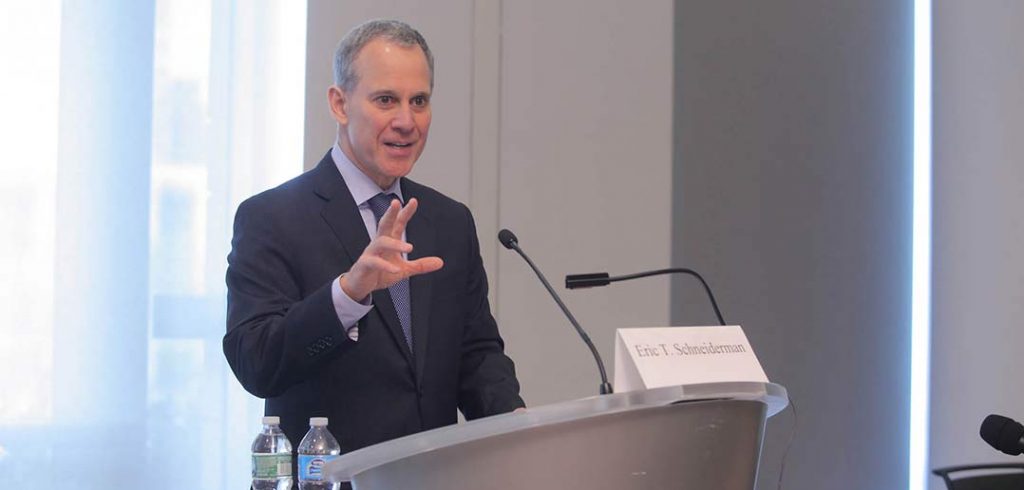New York State Attorney General Eric Schneiderman’s office will partner with Fordham Law School’s Center for Law and Information Policy (CLIP) to help start-up technology companies navigate the state’s laws and regulations.
The partnership, which was announced on April 24 at Fordham’s Lincoln Center campus, will pair New York State’s top legal authorities with companies involved in what has become known as the sharing economy.
“This will help new companies navigate our regulatory system, but it will also help us provide insights to state and local governments about outdated or overly cumbersome rules and trends that we need to be aware of in this rapidly growing sector of New York’s economy,” he said.
Schneiderman’s announcement was part of his keynote address at the daylong conference, “Sharing Economy, Sharing City: Urban Law and the New Economy,” organized by the Urban Law Center.
The partnership with Fordham Law is one of three between his office and area colleges, including the Cardozo School of Law at Yeshiva University and Brooklyn Law School. Schneiderman, whose office has investigated the sharing economy practices of businesses such as Uber and AirBNB, said he hopes to head off potential problems before they happen. The attorney general’s office is not allowed to advise individual companies, he noted, but programs such as CLIP can.
“We’re very excited to have law students, professors, and lawyers working with these clinics to advise startups … as they move into New York,” he said.
Joel Reidenberg, founding academic director of CLIP, said that the announcement reflects CLIP’s longstanding relationship with the attorney general’s Internet bureau.
“Today’s announcement by Attorney General Schneiderman reflects an evolution of that relationship, and an advancement of CLIP’s work as a research think tank on information technology law and policy issues,” he said.
Getting a handle on the sharing economy is critical because many companies involved in it are poised for exponential growth: Price Waterhouse Coopers estimates that 10 years from now, the sharing economy will control 50 percent of the total revenue of all the rental sectors.
“As the sharing economy rapidly evolves into a mature and important part of America’s economic life, … it is no longer credible for its companies to cling to what I have called a cyber-libertarian vision of a regulation-free environment,” Schneiderman said.
“Just because a company has an app instead of a storefront does not mean laws do not or should not apply.”
With CLIP and other university-based organizations doing consulting, Schneiderman suggested there might be fewer law-breakers to catch.
As an example of getting out in front of crimes, Schneiderman mentioned that his office—once plagued with caseloads of smart phone thefts (3.1 million in 2013 alone)—worked with the iPhone technology to stop them. Rather than spending tax dollars on trying to break up the cartels that were profiting from the thefts, Schneiderman said his office focused on working with Apple in getting kill switches installed in phones, thus removing the theft incentive in the first place.
“Lets try to get the regulations right, lets prioritize our work and engage in an honest and open collaboration,” he said.
“If we do that, the sharing economy holds enormous potential to be a dramatic agent of positive change for our city, or state, and the world as a whole.”

